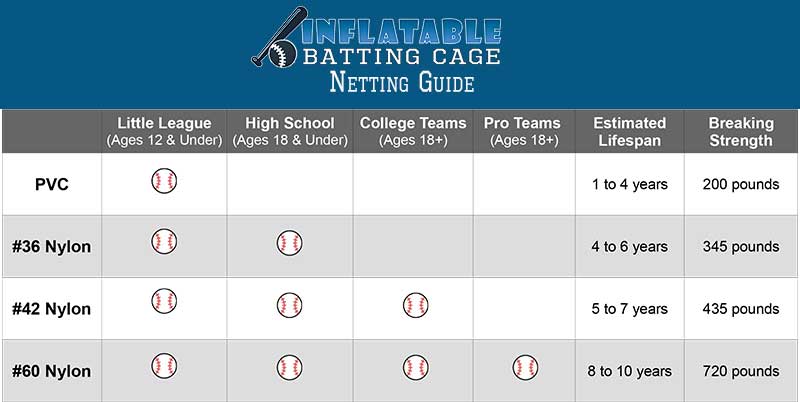What is the Best Batting Cage Net? PVC Vs. Nylon Netting
The type of netting you use for your batting cage should be highly determined by your use case. The decision between PVC netting and Nylon netting along with the batting cage nets gauge comes down to multiple factors.
Considerations Based on Player Age and Usage Frequency
When choosing the material and gauge for your batting cage net, it's important to consider the age range of the players as well as how frequently the net will be used. Nets suitable for younger players may not be adequate for older, more powerful hitters. For home installations, PVC nets often meet the needs of our customers; however, those requiring more durability, particularly in commercial setups, tend to prefer the added strength of a #36 Nylon net and college level or pro baseball players may want to consider #60 Nylon.
Following is a breakdown of the different batting cage net options and our recommendations on which is best for the different use cases.

Polyethylene (PVC) Batting Cage Nets
PVC is a material choice for those seeking a more rigid and less flexible option in batting cage nets. Its rigidity contributes to a reduced lifespan compared to Nylon nets. However, this characteristic also makes it a more budget-friendly option. Poly nets are an ideal choice for individuals or organizations needing a net for light, occasional use within a limited budget. They offer a practical solution for recreational batting cages.
Nylon Batting Cage Nets
Nylon stands out as a premium material for batting cage nets, boasting exceptional durability and superior resistance to wear and tear. Its capacity to effectively absorb the force of a baseball significantly extends its lifespan, albeit at a slightly higher cost compared to PVC nets. Nylon nets are particularly well-suited for more intense, frequent use scenarios such as commercial training centers, school and university sports teams, professional teams, or for those desiring a long-lasting net for personal use at home.
Net Thickness and Durability
The durability of a batting cage net is directly related to the thickness of the netting, commonly measured in gauge. The gauge number indicates the twine diameter; a higher number signifies a thicker and more durable net. For instance, our popular #36 Nylon offers a balanced blend of durability and cost-effectiveness. For commercial settings, we recommend the even thicker #60 Nylon for its extended lifespan. Following is an overview of each of the gauges we offer.
#36 batting cage net stands out as the premier option among enthusiasts and professionals alike, offering exceptional value. Its widespread acceptance spans from little league teams to collegiate sports, indoor training centers, and even some professional major league baseball teams. Characterized by its durability, the net's thickness is slightly more than half that of a standard pencil, featuring 1-3/4″ square mesh. When used regularly within a batting cage setup, its lifespan extends from 4 to 6 years. The netting boasts a robust breaking strength of 345 pounds.
#42 nylon net represents an advanced option beyond the #36, favored by professional MLB teams for their batting practice enclosures. With a thickness approximately three-quarters that of a pencil, this net offers exceptional durability. Featuring 1-3/4″ square mesh, the net is designed to endure. Under regular usage conditions within a batting cage, it is capable of lasting between 5 to 7 years. The strength of this netting is impressive, with a breaking strength of 435 pounds.
#60 netting is favored selection among discerning clients aiming for a batting cage that stands the test of time, offering a solid 8-10 years of usability. This net boasts a thickness comparable to that of a pencil, equipped with 1-3/4″ square mesh. When employed regularly within a batting cage setting, its durability can stretch beyond a decade. The netting's substantial breaking strength of 720 pounds underscores its exceptional quality and endurance, making it a top-tier choice for those prioritizing longevity in their equipment.
